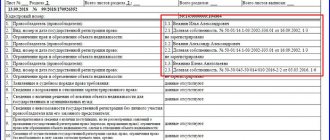Concept of family law
The set of legal norms regulating legal relations between citizens upon marriage, relatives, and persons who have adopted children into a family constitutes family law. Family legislation has certain specifics: the Constitution of the Russian Federation of 1993 refers it to the joint jurisdiction of the Russian Federation and its constituent entities. This regime establishes that a normative legal act can be adopted at the level of the federal government and in the constituent entities of the Russian Federation. This is the concept of family law.
At the same time, the law establishes that a legal act must not conflict with the Federal Law.
Consultation with a lawyer on the division of property of the MIP legal group will win a family case with a guarantee of results!
The concept of rule-making in relation to the constituent entities of the Russian Federation is defined in two ways. Subjects can create and issue legal acts in the following cases:
- the legal act issued by the constituent entities of the Russian Federation is assigned by the Code to their jurisdiction;
- the absence in the RF IC of a legal norm that regulates the current legal relationship.
Based on this, the legal act created by the constituent entities of the Russian Federation mainly resolves issues of marriageable age and the organization of the work of guardianship and trusteeship bodies.
Family law of the Russian Federation 4.1. Marriage and family relations
1. Grounds for the emergence of family and marriage relations, their content
2. Concept, grounds and procedure for divorce
3. Personal non-property and property relations between spouses
Family legal relations, which are the subject of family law, are social relations in which its participants are bound by property and personal non-property rights and obligations arising from marriage, kinship, adoption and other forms of placement of children left without parental care.
The principles of family law mean the basic provisions on which family legal relations should be based. These include: principles of protection of family, motherhood, paternity and childhood; recognition of a legally registered marriage; voluntariness of marriage; equality of spouses in the family; the inadmissibility of anyone’s interference in the family’s affairs; priority of family education of children; ensuring priority protection of the rights and interests of minor children; family protection by the state.
The subjects of family legal relations are only citizens whose family legal personality is revealed through legal capacity and capacity. Family legal capacity arises in a person from the moment of birth, but its scope changes with the age of the subject. Restriction of family legal capacity is possible only in cases and in the manner expressly determined by law (for example, deprivation of parental rights by a court). The law does not indicate the age at which full family legal capacity arises, but in most cases it coincides with the moment when legal capacity arises (the age of marriage is 18 years). The scope of family capacity depends to a certain extent on the scope of civil capacity. (If a person is deprived of civil capacity in accordance with the established procedure due to a mental disorder, the person also loses family capacity, in particular, does not have the right to marry).
The objects of family legal relations are the actions (behavior) of the subjects of the legal relationship, as well as things (property) or other material goods.
The direct content of family legal relations consists of the rights and obligations of the subjects. The scope of these rights and obligations (as well as the grounds for their occurrence, change and termination) are specified in individual family law institutions.
The Family Code does not define marriage, but determines the procedure and conditions for its conclusion. When concluding a marriage, the presence of both persons entering into marriage is required, who must express mutual voluntary consent to enter into a family union, and must also have reached the age of marriage. If there are good reasons, local governments may allow persons over the age of 16 to marry. Marriage before the age of 16 (as an exception, taking into account special circumstances) may be established by the laws of the constituent entities of the Russian Federation.
For the first time, the law introduced a medical examination of those entering into marriage, which is carried out free of charge and only with the consent of the persons entering into marriage. In accordance with Art. 15 of the RF IC, the basis for one of the spouses to apply to the court with a request to recognize the marriage as invalid is the fact that the spouse concealed the presence of HIV infection or a sexually transmitted disease
In addition, the law does not allow marriages between direct relatives - brothers and sisters, parents and children; grandparents and grandchildren; adoptive parents and adopted children. Polygamy is prohibited by law, i.e. It is not allowed to enter into a marriage between persons if at least one is already in another registered marriage. Concealing this fact is grounds for declaring the marriage invalid. A fictitious marriage is also considered invalid, i.e. a marriage registered only for show, without the intention of starting a family, but for other purposes (for example, to obtain the right to living space, etc.).
If a marriage is declared invalid by a court, then it is considered that it did not exist at all and no rights or obligations arose between the persons involved (the acquired property is not considered common). There is one exception to this rule: the spouse whose rights were violated by the conclusion of such a marriage (a bona fide spouse) has the right to demand payment of alimony (subject to incapacity and need), as well as the division of common property according to the norms of family law on joint marital property. A conscientious spouse has the right to demand compensation for material and moral damage.
The termination of a marriage occurs due to the death of one of the spouses or the declaration of death of one of the spouses.
Marriage also ends by dissolution. Divorce terminates the legal relationship between the spouses for the future after the dissolution of the marriage, if the spouses have mutually decided that it is impossible to continue family life.
A marriage is dissolved in the registry office when there are no common minor children (the marriage is dissolved in the registry office if the court recognizes the spouse as missing; if the court recognizes the spouse as incompetent; if the spouse is sentenced to imprisonment for a term of more than 3 years). Divorce is carried out after one month from the date of filing the application (Article 19 of the RF IC).
Divorce in court (Article 21 of the RF IC) is carried out if the spouses have minor children, or in the absence of consent to divorce of one of the spouses, and also if the spouse evades divorce from the registry office.
The law does not list the grounds for divorce, so the court is guided by a general criterion: the impossibility of further family life for the spouses and preservation of the family. If one of the spouses does not consent to divorce, the court gives the spouses a period of reconciliation within three months.
Rights and obligations of spouses in accordance with clause 2 of Art. 10 of the RF IC arise from the date of state registration of marriage in the registry office. Relations arising between spouses are divided into personal non-property and property.
The law includes the personal non-property rights of spouses: the right to choose a surname upon marriage or upon its dissolution; the right to freedom of choice of occupation, profession; the right to a place of stay and place of residence; the right to jointly resolve issues in family life. Personal non-property rights and obligations cannot be terminated or changed by agreement between spouses. Personal non-property rights and obligations are primary. On their basis, property relations arise that are of a derivative nature, which can be divided into property relations and alimony legal relations.
Property relations between spouses are regulated by Art. 33, 34 of the RF IC (legal regime of property of spouses) and Art. 40 of the RF IC (relations regulated by a marriage contract).
The legal regime of the property of spouses is the regime of their joint property. It is valid unless otherwise provided in the marriage contract. The joint property of the spouses consists of property acquired by the spouses during marriage, registered in the manner prescribed by law. Objects of common property include - property that spouses acquired jointly at the expense of common income (housing, land, vehicles, furniture, etc.); income from labor, entrepreneurial and intellectual activities; securities, shares and shares in capital, deposits made in credit institutions and other commercial organizations; pensions, benefits and other monetary payments that do not have a special purpose. The right to the common property of the spouses also belongs to the spouse who, during the marriage, managed the household, cared for children, or for other valid reasons did not have independent income. The law provides for the disposal of jointly owned property with the consent of the spouses. In other words, it is understood that the transaction made by one of the spouses regarding the disposal of common property is carried out with the consent of the other spouse. Some types of transactions require the notarized consent of the other spouse for one of the spouses to complete the transaction (for example, the sale of a house, land, share in capital).
During a divorce, the joint property of the spouses is divided in half. The property of each of the spouses, i.e. personal property is what each spouse owns, uses and disposes of independently, at their own discretion. Personal property includes: property owned by each spouse before marriage (premarital property); received as a gift; by way of inheritance and other gratuitous transactions; items for personal use; amounts received for the intended purpose.
The Family Code of the Russian Federation provides for the conclusion of a marriage contract both during marriage and before its registration. The agreement is subject to notarization. A marriage contract can change the legal regime of joint property; in addition, spouses have the right to determine their rights and obligations regarding mutual maintenance, and the procedure for incurring family expenses. However, a marriage contract cannot limit the legal capacity and capacity of the spouses, violate the principles of equality of men and women in marriage and maintain conditions that would contradict the general principles of family law. The prenuptial agreement terminates upon the termination of the marriage. It can be amended and terminated by mutual consent of the spouses at any time.
The alimony obligation is understood as a legal relationship arising from an agreement between the parties in a court decision, by virtue of which some family members are obliged to provide maintenance to other members, and the latter have the right to demand it.
The agreement of the parties on the payment of alimony, which is concluded between the person obliged to pay alimony and the recipient, as well as the legal representatives of these persons, must be notarized. In the absence of an agreement, alimony is collected in one court order, and the amount of alimony for minor children is established by law as a percentage of the earnings and/or other income of the parent: for one child one quarter, for two children - one third, for three or more children - half of earnings (income). The legislation provides the parties with the opportunity to independently determine the methods and procedure for paying alimony. As payment of alimony, it is allowed to provide certain property (apartment, residential building, land, etc.). If the person obligated by a court decision to pay alimony does not have sufficient earnings to pay alimony, the writ of execution is handed over to the bailiff, who collects alimony from the person’s funds held in a bank or other credit institutions. Execution may also be made against any other property of the person obligated to pay alimony.
Labor law of the Russian Federation 5.1. Employment contract
1. The concept of an employment contract
2. Procedure for concluding an employment contract
•3. Grounds for termination of an employment contract
Social relations that develop in the process of applying and organizing the work of workers are put into legal form through legal norms. The system of legal relations in the field of labor law includes the following legal relations: 1) labor; 2) organizational and managerial between the workforce and the administration of the enterprise (institution, organization); 3) for employment; 4) on professional training; 5) on supervision of labor protection and compliance with labor legislation; 6) for the consideration of labor disputes. The leading place in the unified system of legal relations is occupied by labor relations.
Labor legal relations are legal relations regarding the use of employee labor in an enterprise, institution, or organization, regardless of the form of ownership and management. The subjects in this legal relationship are specific, each of which is endowed with special powers and responsibilities.
One of the subjects of the labor relationship is an individual employee. To enter into labor relations, an employee must have legal personality at work. Labor legal personality is a legal category that expresses the ability of citizens to be subjects of labor legal relations, to acquire rights through their actions and to assume responsibilities associated with entering into these legal relations. Such legal personality begins at the age of 16. But in cases of receiving basic general education or leaving a general education institution in accordance with federal law, persons over 15 years of age can also enter into labor relations. Students can carry out work activities from the age of 14, with the consent of one of the parents (guardian, trustee) or guardianship authority required. In cinematography organizations, theaters, theatrical and concert organizations, circuses, it is allowed, with the consent of one of the parents (guardian, trustee) and the guardianship and trusteeship authority, to conclude an employment contract with persons under the age of fourteen to participate in the creation or performance of works without harm to health and moral development.
An employee, as a party to an employment relationship, has various legal ties with the other party - a legal entity (organization) or an individual.
The circumstances with which the law connects the emergence, change or termination of legal relations are called legal facts. Thus, the basis for the emergence of an employment legal relationship is an employment contract, a bilateral act, which represents the agreed expression of the will of a citizen who wants to get a job at a given enterprise, institution, organization and management body of this enterprise. The concept of an employment contract is formulated in Art. 56 of the Labor Code of the Russian Federation is an agreement between an employer and an employee, according to which the employer undertakes to provide work for a specified labor function, provide working conditions provided for by law, pay the employee wages in a timely manner and in full, and the employee undertakes to personally perform the work determined by this agreement labor function, comply with the internal labor regulations in force in the organization. This definition contains the generic characteristics of an employment contract:
— subject (performing work in a specialty, qualification or position);
— organizational (subordination of the work performer to the internal labor regulations of the enterprise);
- property (the administration’s obligation to pay wages) in the manner prescribed by law).
These signs make it possible to distinguish an employment contract from related contracts related to the use of labor (civil contracts of assignment, contract, literary commission, etc.).
Depending on the period for which the employment contract is concluded, there are two types of employment contracts: 1) a contract concluded for an indefinite period; 2) a fixed-term employment contract for a period of no more than five years.
A fixed-term employment contract is concluded when the employment relationship cannot be established for an indefinite period, taking into account the nature of the work to be performed, subject to its completion. The Labor Code provides an exhaustive list of information regarding when a fixed-term employment contract can be concluded.
To establish an employment relationship, in some cases it is necessary to perform other legal actions before concluding an employment contract: holding elections, competition, appointment to a position.
The employment contract is concluded in writing and signed by both parties. It is drawn up in two copies, and each party keeps one copy for itself. Hiring is formalized by a written order (instruction) for the enterprise, which is brought to the attention of the employee against signature. The actual admission of a citizen to work, regardless of whether the hiring was properly formalized, is considered the conclusion of an employment contract. In this case, the employer is obliged to draw up an employment contract with the employee in writing no later than three days from the date of the latter’s actual admission to work. When hiring, the administration has the right to require a work book from the employee (for people entering work for the first time - a certificate from the place of residence about the last occupation); passport; for those discharged from the army - a military ID; insurance certificate of state pension insurance, document on education, when applying for a job that requires special knowledge and special training.
In accordance with Art. 64 of the Labor Code of the Russian Federation prohibits unreasonable refusal to hire. Unreasonable should be understood as a refusal that directly contradicts the law (based on gender, race, nationality, language, origin, property, social and official status, place of residence), as well as other circumstances not related to the employee’s business qualities. It is prohibited to refuse to conclude an employment contract to women for reasons related to pregnancy or the presence of children. The reason for refusal at the request of a person who is denied an employment contract must be communicated by the employer in writing. Refusal to conclude an employment contract can be appealed in court.
When concluding an employment contract, a test may be established by agreement of the parties to verify the employee’s suitability for the work assigned to him.
The probationary clause must be specified in the employment contract. During the probationary period, workers are fully covered by labor laws. The probationary period cannot exceed three months, and for heads of organizations and their deputies, chief accountants, etc. - six months. If the probation period has expired and the employee continues to work, he is considered to have passed the test and subsequent termination of the employment contract is allowed only on a general basis. If the test result is unsatisfactory, the employment contract is terminated without taking into account the opinion of the relevant trade union body and without payment of severance pay. The employee has the right to appeal the employer's decision in court.
The content of the employment contract is determined by its parties. This includes establishing the conditions under which the employee carries out his work function. The essential terms of an employment contract are: place of work; work start date; content of the first ore function - work in a certain specialty, profession, qualification; rights and responsibilities of the employee; rights and obligations of the employer; characteristics of working conditions, compensation and benefits; work and rest schedule; terms of remuneration; types and conditions of social insurance directly related to work. An employment contract may impose additional obligations on the employee related to non-disclosure of secrets protected by law; working off after training for a certain period, as well as other conditions that do not worsen the employee’s position in comparison with the Labor Code of the Russian Federation, other laws and regulations in the labor sphere.
The labor legislation of the Russian Federation determines the grounds and procedure for terminating an employment contract. Termination of an employment contract is formalized by issuing an order. It and the employee’s work book indicate the grounds for termination of the employment contract and make reference to the clause and article of the Labor Code of the Russian Federation. Depending on the legal actions underlying the termination of the employment contract, these grounds can be classified into four groups:
1. Termination of an employment contract by mutual will of the parties (Article 78 of Labor Code 1'F).
2. Termination of an employment contract at the initiative of the employee (Article 80 of the Labor Code of the Russian Federation).
3. Termination of an employment contract at the initiative of the employer (Article 81 of the Labor Code of the Russian Federation).
4. Termination of an employment contract on the initiative of bodies that are not a party to the first ore contract (Article 83 of the Labor Code of the Russian Federation).
Most often, employment contracts are terminated at the initiative of employees. In this case, the employee must notify the employer of termination of the employment contract in writing two weeks in advance. By agreement between the employee and the employer, the employment contract can be terminated even before the expiration of the notice period for dismissal. Before the expiration of the notice period for dismissal, the employee has the right to withdraw his application at any time, unless another employee is invited in his place in writing, who, in accordance with the law, cannot be denied an employment contract. Upon expiration of the notice period for dismissal, the employer is obliged to issue the employee an ore record book and make a final settlement with him.
Labor legislation defines an exhaustive list of grounds and procedure for dismissing an employee at the initiative of the administration (Article 81 of the Labor Code of the Russian Federation). At the same time, it is not allowed to dismiss an employee at the initiative of the employer (except in the case of liquidation of the organization or termination of activities by the employer - an individual) during the period of his temporary disability and while the employee is on vacation.
Labor discipline
1. Legal regulation of internal labor regulations
2. Disciplinary offense and disciplinary liability -
3. Material liability of the parties to the employment contract
A distinctive feature of labor relations is joint collective work, which is unthinkable without a certain order, without a certain organization, coherence and discipline of its participants.
Labor discipline is obligatory for all employees to obey the rules of conduct established at enterprises, institutions and organizations in accordance with the Labor Code of the Russian Federation, laws, collective agreements, agreements, employment contracts, and local regulations of the organization.
The main regulation of labor discipline is contained in the internal labor regulations, which are approved by the employer taking into account the opinion of the representative body of the organization's employees. These rules must be posted on the premises of enterprises, institutions, and organizations in prominent places. They contain the basic rights and responsibilities of the administration, staff and workers.
Employees are obliged:
- work conscientiously;
— comply with the internal labor regulations of the organization; observe labor discipline;
comply with established labor standards;
— comply with labor protection and occupational safety requirements;
- treat the property of the employer and other employees with care; immediately inform the employer about the occurrence of a situation that poses a threat to the life and health of people, the safety of the employer’s property.
The administration of enterprises, institutions, organizations is obliged to:
— comply with laws and other regulatory legal acts, local regulations, terms of the collective agreement, agreements and employment contracts;
ensure labor safety and conditions that meet occupational safety and health requirements;
— provide workers with equipment, tools, etc.;
— consider submissions from the relevant trade union bodies about identified violations of laws, take measures to eliminate them;
— provide for the everyday needs of employees related to the performance of their job duties;
— carry out compulsory social insurance of employees;
compensate for harm caused to employees in connection with the performance of their job duties, as well as compensate for moral damage.
Internal labor regulations specify the above responsibilities, taking into account the specifics of the industry and the tasks of the enterprise, institution, or organization.
Employees who violate labor discipline are subject to disciplinary action, which is one of the types of legal liability.
Disciplinary liability is imposed on an employee for a disciplinary offense committed by applying disciplinary sanctions to him.
A disciplinary offense is understood as an unlawful, culpable failure or improper performance by an employee of his or her job duties. Bringing employees to disciplinary liability is possible if three conditions are met. First, the employee must commit a disciplinary offense; second, the offense committed by the employee must be unlawful; third, disciplinary action can be applied if the employee’s actions are at fault.
In Art. 192 of the Labor Code of the Russian Federation provides for the following types of disciplinary sanctions: I) reprimand; 2) reprimand); 3) dismissal for appropriate reasons. Federal laws, charters, and regulations on discipline for certain categories of employees may also provide for other disciplinary sanctions. At the same time, the application of disciplinary sanctions not provided for by federal laws, charters and regulations on discipline is not allowed.
The legislation establishes the procedure for applying disciplinary sanctions (Article 193 of the Labor Code of the Russian Federation). Before disciplinary action is taken, a written explanation must be required from the employee. An employee’s refusal to give an explanation cannot serve as an obstacle to the application of a penalty. Disciplinary action is applied no later than one month from the date of discovery of the misconduct, not counting the time of illness of the employee, his stay on vacation, as well as the time required to take into account the opinion of the representative body of employees. A disciplinary sanction cannot be applied later than six months from the date of commission of the offense, and based on the results of an audit, inspection of financial and economic activities or an audit - no later than two years from the date of commission. (The specified time frame does not include the time of criminal proceedings). For each disciplinary offense, only one disciplinary penalty can be applied. The employer's order (instruction) to apply a disciplinary sanction is announced to the employee against signature within three working days from the date of its publication. In cases where an employee refuses to sign the specified order (instruction), a corresponding act is drawn up. A disciplinary sanction can be appealed by an employee to state labor inspectorates or bodies for the consideration of individual labor disputes. If within a year from the date of application of a disciplinary sanction the employee is not subject to a new one, then he is considered not to have had a disciplinary sanction. A disciplinary sanction can be lifted by the employer before the end of the year on his own initiative, at the request of the employee himself, at the request of his immediate supervisor or a representative body of employees.
In the process of an employee performing his job duties, he may commit not only disciplinary offenses, but also property offenses, and vice versa - the employee may suffer material damage due to the fault of the administration. Material liability (Article 233 of the Labor Code of the Russian Federation) of a party to an employment contract arises for damage caused by it to the other party as a result of its guilty unlawful behavior (action or inaction). Each party to the employment contract is obliged to prove the amount of damage caused to it.
The employer's financial liability to the employee arises in the following cases:
- if the employer illegally deprived the employee of the opportunity to work;
- if the employer caused damage to the employee’s property;
- if the employer violated the established deadline for payment of wages;
- if the employer caused moral harm to the employee through unlawful actions or inaction.
The employee’s financial liability represents the obligation to compensate the employer for direct actual damage caused to him. Direct actual damage is understood as a real decrease in the employer’s available property or deterioration in the condition of the specified property, as well as the need for the employer to make costs or unnecessary payments for the acquisition or restoration of property. The employee is also responsible for damage incurred by the employer as a result of compensation for damage to other persons.
The legislation distinguishes between two types of liability: limited and full. With limited financial liability, the maximum amount of compensation for damage caused is limited to the average monthly earnings. In case of full financial liability, the damage caused is recovered in full without any restrictions on wages. Full financial liability occurs in cases established by law (Article 243 of the Labor Code of the Russian Federation):
1) when, in accordance with the law, the employee is held financially liable in full for damage caused to the employer;
2) shortage of valuables entrusted to the employee on the basis of a special written agreement or received by him under a one-time document;
3) intentional infliction of damage; ~~
4) causing damage while under the influence of alcohol, drugs or toxic substances;
5) damage caused as a result of criminal actions of the employee, established ?
court verdict;
6) damage caused as a result of an administrative violation, if established by the relevant government body;
7) disclosure of information constituting a secret protected by law in cases provided for by federal laws;
 the cause of the damage was not due to the employee’s performance of work duties.
the cause of the damage was not due to the employee’s performance of work duties.
Full financial responsibility can be individual and collective (Applicable). The amount of damage caused is determined by actual losses, calculated based on market prices prevailing in the area on the day the damage was caused, but not lower than the value of the property according to accounting data, taking into account the degree of depreciation of this property.
Recovery from the guilty employee of the amount of damage caused, not exceeding the average monthly salary, is carried out by order of the employer. The order can be made no later than one month from the date the amount of damage caused by the employee is established.
If the monthly period has expired or the employee does not agree to voluntarily compensate for the damage caused to the employer, and the amount of damage exceeds the average monthly salary, c| collection is carried out in court.
Damage caused by an employee may be voluntarily compensated by him in full or in part. With the consent of the employer, the employee may transfer equivalent property to compensate for the damage caused or repair the damaged property.
Compensation for material damage is made regardless of whether the employee is brought to disciplinary, administrative or criminal liability for actions or inactions that caused damage to the employer.
Principles of family law
The concept of principles of family law is to determine the fundamental principles on the basis of which the branch of law is built. The principles of family law are closely related to constitutional provisions. Principles of family law:
- reveal the concept of what can be considered support from the state for fathers and mothers;
- define the concept of what is a state guarantee of family protection;
- establish the foundations of the constitutional order.
Family legislation is aimed at protecting the rights and freedoms of citizens, and also reveals the concept and tasks of legal regulation. At the same time, the legislator establishes priority universal human values: love, respect, the concept of responsibility of parents to children, mutual assistance of all family members. These principles remain unchanged. It is interesting that the RF IC does not establish the concept of family.
The principles of family law are enshrined in regulations. The concept of each of them is unchanged, and the principles must be followed in marriage and family relations. The principles include the concept that, from a legal point of view, relationships concluded in the form of marriage in the registry office are considered official. Marriage must comply with moral and ethical guidelines, as well as legal norms.
Do you need help from a family law specialist?
Sign up for a consultation with the practice manager
+7
Mutual rights and obligations of spouses, parents and children
The rights and obligations of spouses arise from the moment of state registration of marriage. Let us recall that they are divided into two groups: property and non-property. Let's take a closer look at each group of rights and responsibilities.
Personal non-property and property rights and obligations of spouses
The first group consists of personal non-property rights and obligations of spouses. These include:
- the right to choose a common surname for one of the spouses, a double surname by adding the wife’s surname to the husband’s surname, or to remain with one’s surname;
- the right to jointly resolve all issues of family life and raising children;
- the right to choose a place of residence, choose a profession and occupation.
The second group consists of personal property rights and obligations of spouses, which may have both legislative and contractual regimes. Let us highlight some provisions of family law in this area of relations.
Everything that belonged to each spouse before marriage remains his personal property, and he has the right to independently dispose of this property.
Property acquired during marriage is recognized as the joint property of the spouses, who enjoy equal rights in relation to this property.
Joint property does not include property received by spouses during marriage as a gift or by inheritance, as well as personal items, with the exception of luxury items.
The regime of joint ownership of property of spouses established by law can be changed by a marriage contract.
A prenuptial agreement is a written agreement in which spouses define their property rights and responsibilities during the marriage and in the event of its dissolution.
The purpose of a prenuptial agreement is to change the legal regime of marital property to best suit the needs of the spouses. The parties to such an agreement are persons wishing to marry or spouses. Any other persons have no right to enter into a marriage contract.
The subject of the marriage contract is the property rights and obligations of the spouses, subject to the legal regime of their common property, as well as any other property rights and obligations that may belong to the spouses by virtue of civil law.
A marriage contract is subject to notarization, and if it is concluded before marriage, it becomes valid from the moment the marriage is registered with the registry office. Spouses have the right to determine in the marriage contract also their rights and obligations regarding mutual maintenance, ways of participating in each other’s income, the procedure for each of them to bear family expenses and other issues relating to property relations.
A marriage contract cannot limit equality in marriage, regulate personal rights and obligations between spouses, rights and obligations in relation to children, or contain conditions that place one of the spouses at a severe disadvantage or are contrary to family law.
Let us consider the rights and responsibilities of parents and children that arise as a consequence of family legal relations.
Rights and responsibilities of parents and children
The rights and obligations of parents, when certifying the origin of a child from these persons, arise from the moment the child is born and terminate when he reaches 18 years of age, as well as when the minor marries or is emancipated.
For emancipation, it is necessary that a minor work under an employment agreement or contract or, with the consent of his parents, adoptive parents or guardian, engage in entrepreneurial activity.
The relationship between parents and children usually develops on the basis of consanguinity as a result of the children's descent from their parents. However, the modern level of development of medicine is capable of ensuring the birth of a child not only as a result of biological origin (consanguinity), but also by transplanting an embryo conceived in the body of another woman, artificial insemination, and even growing an embryo in a special chamber. In this regard, relationships based on facts to which the law attaches legal significance are equated to parental ones.
Parental legal relationship is a set of personal and property relations between parents and child regulated by the norms of family law.
The content of the parental legal relationship is formed by the rights and obligations of the parent and his child in relation to each other.
Parents have the right and responsibility to raise their children. They have the right to personal education of their children.
Parents have the responsibility to raise their children mentally, morally and spiritually healthy. They must instill in children a sense of devotion to the Motherland, a conscientious attitude to work, and responsibility to the family. Parents must take care of the physical development of their children, their education and preparation for socially useful activities. They must prepare children for active participation in the affairs of the state and provide financial support to minor children.
Parents are obliged to ensure that their children receive general education, i.e. education in the amount of 11 classes of secondary school. Parents are the legal representatives of their minor children, that is, persons who, by virtue of the powers available by law, carry out transactions and other legal actions on behalf of the represented person.
It is the responsibility of parents to protect the rights and interests of their children. Parents defend the rights and interests of children in relations with any individuals and legal entities, including in the courts, without special powers.
Parents must raise and supervise their children. Education involves instilling certain traits and skills, and supervision involves preventing various negative consequences.
Children have the right to physical and spiritual development, as a result of which they will be able to become full-fledged members of society, participate fruitfully in all areas of life, and most fully satisfy their material, spiritual and cultural needs. The child also has a number of rights:
- for life and upbringing in a family;
- to be cared for and educated by their parents;
- to ensure his interests;
- comprehensive development and respect for human dignity;
- to communicate with your relatives;
- to protect their legal rights and interests;
- for rest and leisure;
- participate in age-appropriate games and recreational activities;
- take part in cultural and creative life, etc.
A child has the right to know his parents, to express his opinion on all matters concerning his life, to receive maintenance and ownership of property that belongs to him.
A separate chapter of the RF IC is devoted to the characteristics of the rights of minor children. Its contents correspond to the Convention on the Protection of the Rights of the Child, ratified by the USSR on June 13, 1990.
Children are assigned by law the responsibility to support and care for their parents. If able-bodied adult children forget about their debt to their parents, alimony in favor of their parents can be recovered from them in court. The amount of alimony is determined depending on the family and financial situation of the parents and children.
Maintenance obligations of adult children arise only in relation to parents who are disabled and in need of help. Parents' inability to work may be related to their retirement age or disability. Neediness is expressed in the lack of funds to provide the parent with a living wage.
When determining the amount of alimony, the court has the right to take into account all adult children of a given parent, regardless of whether a claim is brought against all the children, several of them, or one of them.
If parents have been deprived of parental rights, they cannot demand funds from their children for their maintenance. The court may release children from the obligation to support their parents in cases where it is convinced that the parents, although they were not deprived of parental rights, at one time evaded the upbringing and maintenance of their children.
Let's consider the alimentary obligations of other family members.
Maintenance obligations of spouses and other family members
Not only parents and children, but other family members should also help their family members in need. If children do not have parents or the parents do not have sufficient funds, then the responsibility for supporting the children falls on the grandfather, grandmother, brothers and sisters. These persons are also obliged to support their grandchildren, brothers, and sisters who are adults, but disabled and in need of outside help, if they cannot receive support from their parents or spouses. In turn, grandchildren are obliged to support their grandparents if their children or spouses cannot support them. The law also obliges stepsons and stepdaughters to support their stepfather and stepmother.
Former pupils must pay alimony for the maintenance of their actual educators, if the latter supported and raised them for at least five years and properly, although they did not formalize this upbringing by adoption.
In most of the listed obligations, the alimony payer is, as a rule, an able-bodied person who has all the necessary means. The recipient of alimony, on the contrary, is disabled or has not reached the age of majority.
The amount and procedure for paying alimony may be established by agreement of the parties, or, in its absence, by a court decision. In this case, the financial and marital status of both the payer and the recipient of alimony, as well as other noteworthy interests of the parties, must be taken into account. Alimony is paid monthly in a fixed amount.
What goals does the legislator pursue when regulating family legal relations?
Family legislation and other acts containing norms of family law pursue the following goals:
- family strengthening;
- inadmissibility of interference in family affairs.
Marriage, as a legal fact, gives rise to legal consequences leading to the emergence of legal relations between the parties specified in the laws.
The family is under state protection and needs guarantees.
Some legal experts consider the position that moral and ethical guidelines are considered the principles of family law as a controversial issue. This is the existence of the institution of family on mutual love, sympathy, mutual assistance. However, it cannot be denied that these principles significantly influence the creation of an atmosphere in the family, and also run as a “red thread” through many provisions of the Family Code.
Composition of family law
The sources of family law act as a form of external expression of legal provisions and enshrine them in documents. The following normative legal acts have been introduced into family legislation:
1. Constitution of the Russian Federation of 1993. In Article 7, paragraph 2, the law defined the principle of assistance to Russian families from the state. In addition to defining the competence of the center and regions, the Constitution contains a number of legal provisions, which are reflected in legal acts. For example, these are articles 19, 38, which establish the equality of both sexes in rights and freedoms, as well as the obligation of parents to raise children, as well as the obligation of children over 18 years of age to support their parents.
2. Family legislation, Family Code (No. 223-FZ) defines:
- basic principles;
- the procedure for concluding and dissolving marital relations;
- powers of parents in relation to children (including adopted children);
- parental responsibility;
- application of norms to legal relations in which foreign citizens or stateless persons are participants;
- procedure for judicial protection.
Family legislation is distinguished from previous laws by new provisions introduced simultaneously with the law: on alimony, the procedure for concluding a marriage contract, and the interests of children in foster families.
Family legislation and other acts containing family law norms:
- 143-FZ “On acts of civil status”
- No. 124-FZ “On the basic guarantees of the rights of the child in the Russian Federation”
- Civil Code of the Russian Federation of 1994;
- 44-FZ “On the state data bank on children left without parental care”
Among the sources of family legislation, the Civil Code of the Russian Federation (No. 51-FZ) should be highlighted. In the Family Code you can see a reference norm (Article 4), which points to the Civil Code of the Russian Federation in the event that legal relations cannot be resolved with the help of the RF IC. By-laws at the federal level also cannot be ignored, in particular, the Decree of the President of the Russian Federation of 1996 (No. 712), which determines the directions of family policy, in addition, the Resolutions of the highest executive body of power and others. Sources include treaties concluded at the international level. Russia is a party to the Conventions (On the Rights of the Child), the Universal Declaration of Human Rights, etc.
3. International law. The provisions of international treaties take precedence over national regulations. If an international document establishes a different procedure than that determined by national family law, the provisions of international law apply.
Social norms of the family
The family is a very important social institution, one of the ancient ones existing in our society. Of course, like any social institution, family and marriage have special social norms. They are expressed in the functions of the family, since it is the functional characteristics that determine what rules and norms family members adhere to in one activity or another.
Firstly, reproductive - reproduction of the population, preservation of offspring and continuation of the family. When family members are faced with a choice about how many children they should have, they voluntarily submit to certain social norms. If in our country you can have an unlimited number of children, then in some Asian countries the authorities have long passed laws that regulate childbearing. Families are prohibited from having more than one or two children, as this can harm the economic condition of the country and also lead to overpopulation (for example, in China, where a high population is noted on a very small state territory, which makes China the most populous country in the world) .
Finished works on a similar topic
Course work Social norms of family and marriage 430 ₽ Essay Social norms of family and marriage 230 ₽ Test work Social norms of family and marriage 200 ₽
Receive completed work or specialist advice on your educational project Find out the cost
Secondly, the educational function, which is aimed at the spiritual enrichment and reproduction of the population. The family, with the help of special norms, shapes the child’s personality as a future full member of society and has an educational impact on each family member throughout his life. Raising in a family falls at the stage of primary socialization of the individual, which makes the importance of social norms even higher and necessary for the successful development of the child as a future full-fledged member of society.
Thirdly, this is an economic (material) function that is necessary for some family members to support others. This activity is also regulated by social norms that are inherent in the institution of family and marriage. For example, the social norm is for children to help their parents, especially if they are of incapacitated age or in an incapacitated state (pensioners, disabled people). In addition, it is considered the norm for parents to help their children if they have not yet reached the age of majority (in Russia this is 18 years old, in other foreign countries it is 21 years old).
Regulations on family law
The peculiarity of normative acts of ministries and departments is that they must be registered with the Ministry of Justice of the Russian Federation, and also officially published in the Rossiyskaya Gazeta. The deadline for official publication is 10 days from the date of their registration. This rule regarding departmental regulations was established by the President of the Russian Federation in 1993 (Decree No. 104).
Judicial power and sources of family law. Who sets family law? Article 126 of the country’s Basic Law states that, by virtue of its competence, the RF Armed Forces can give explanations on issues of family practice. The practical application of family law norms with clarifications from the highest judicial body becomes justified and correct.
Judicial practice is not included in the sources of family law. An opinion is given in favor of this: the clarifications of the RF Armed Forces are an interpretation of the norms, but do not establish new provisions; the subject of the interpretation cannot be considered a legislator. Considering the fact that the Supreme Court is engaged in studying, generalizing, and analyzing the judicial practice of lower-level courts, the highest court, on this basis, is developing a universal and unique approach to resolving similar court cases in the future. On this basis, the attitude of specialists to the practice of courts and to the possibility of applying it as a source of law has changed over time. Some theories of law establish that the sources of family law should include the Resolutions of the Supreme Court of the Russian Federation. For example, issues of paternity and child support obligations (1996, No. 9), issues of adoption (1997, No. 7), etc.
What legal relations does family law regulate?
The RF IC is designed to regulate personal and property relations between family members. If the relationship is not subject to legal regulation in the RF IC, the norms from the RF Civil Code, as well as other acts, can be fully applied to them. The application of civil legislation occurs under the condition that it does not conflict with the laws. If the legal relations between family members are not subject to the rules of civil law designed to directly regulate the issues that have arisen, the rules governing similar issues are applied to them. This is called analogy of law. If these norms are absent, then the competence of each family member is determined by the main principles of the branch of family law, not excluding the requirement of humanity. This is called the analogy of law. Family law also applies to family relationships involving foreign citizens, as well as stateless persons.
What are the features of relationships regulated by family law?
The relationship is special because:
- purely personal;
- there are no restrictions on their duration;
- they cannot be alienated, transferred on the basis of succession, or even by agreement of the parties;
- gratuitous;
- are imperative.
Sanctions of a property or non-property nature may be imposed on family relationships in the form of penalties and losses inflicted on the state.
Family relations in a family cannot be called purely property-related, they cannot be measured, they are based on feelings and physical needs of a person. Families have the right to inherit property, and inheritance and donation of property are carried out free of charge.
The Family Code states that dispositive norms have now been increased, and the very method of regulating family rights has changed. Married persons are allowed to draw up prenuptial agreements and stipulate conditions for alimony in the event of a divorce.
Family law does not provide for age restrictions for marriage. Entry is permitted from the age of 18, and it is not prohibited by law even at the age of 60-70, which was completely illegal even before the revolution. Marriage with elderly people was considered deliberately false, with the intent of a property nature.
Family law is an independent branch, which is almost impossible to separate from civil law.
Other acts of family law
- Decree of the President of the Russian Federation of June 1, 2012 N 761 “On the National Strategy of Action in the Interests of Children for 2012 - 2021.”
- Decree of the President of the Russian Federation of May 14, 1996 N 712 “On the Main Directions of State Family Policy.”
- Decree of the Government of the Russian Federation of August 18, 2011 N 686 “On approval of the rules for issuing a document confirming the implementation of basic work on the construction (reconstruction) of an individual housing construction project, carried out with the involvement of maternal (family) capital.
- Federal Law of April 24, 2008 N 48-FZ “On guardianship and trusteeship”.










